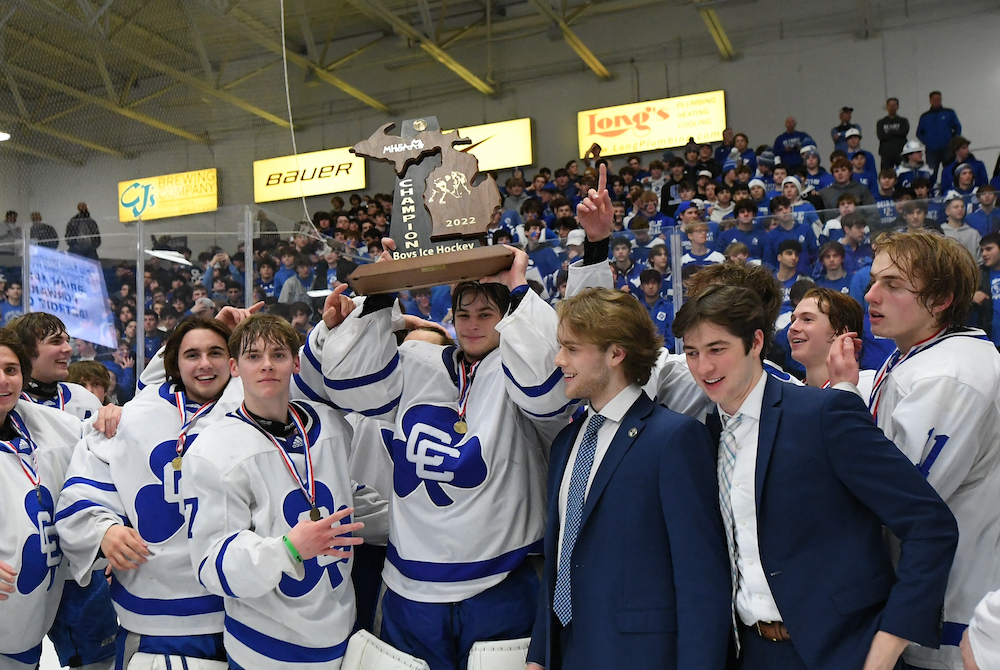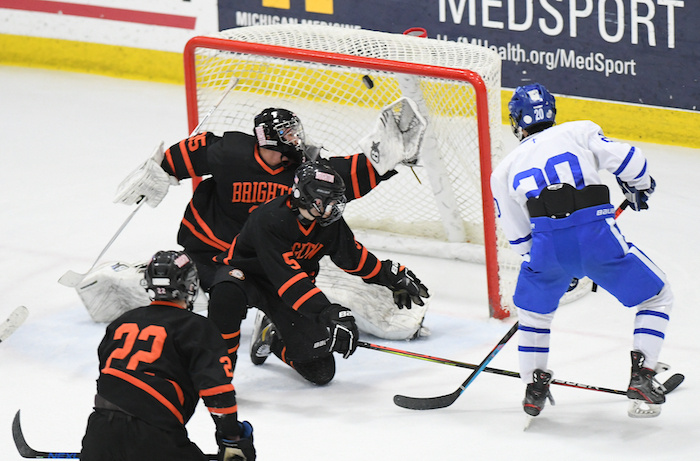
Officials Eager for New Hockey Format
July 12, 2019
By Rob Kaminski
MHSAA benchmarks editor
Tuesday, Feb. 26, was a particularly busy day on the ice as the 2019 MHSAA Ice Hockey Tournament reached just its second day around the state.
On the slate that night were 27 Regional games, bringing the two-day total to 48 on the heels of Monday’s busy calendar.
As teams were busy setting their sights on the ultimate goal, so, too, was another group of accomplished skaters who toil with much less fanfare. Nonetheless, the games can’t start without them – the folks in the striped shirts who call the games.
Just as players and coaches will welcome the expanded playoff format in 2020, the officials are looking forward to the change as well.
“When we got to the first week of the tournament, it seemed like we were going every day,” said Jim Gagleard, who assigns officials for the Livonia Ice Hockey Officials Association. “There are only so many officials to go around in any sport. By allowing us as officials a day or two to catch our breath, it’s good. Good for us, and good for players more than anything.”
If it seemed like every day, well, it was. A total of 66 games were played over the first three days, and 89 over the first four. Considering each game at the Regional level has three officials, that computes to 267 officials needed during that span. On the busiest day, 81 had to take to the ice.
Given that there were a total of 302 playoff-eligible officials in 2019, filling those slots can be a logistical nightmare for assigners at times.
“Regional week will see a huge burden alleviated for officials and especially assigners. There will be so much more flexibility under the new format,” said Dan DiCristofaro, President of the Northeast Hockey Referees Association. “Last year, we were faced with so many doubleheaders at single sites, and the first games needed an early start so that the second games would not last late into the evening on school nights.
“At times, the most important factor for the assigner was scheduling those officials who could get to the arena for the early start times. Merit and ability sometimes had to take a back seat.”
Gagleard agrees, saying, “Assigning-wise, early games are the toughest to fill. Everyone has a job, and in order to work a game they have to tell the boss they’re leaving at 2:30 for a 5 o’clock game. You start to look for officials who are retired, or can get out of work, instead of the most qualified. That’s not fair to the teams playing.”
In the northern reaches of the Upper Peninsula, the problem is more acute.
Sean Jacques is the athletic director at Calumet, and also an experienced official, having skated the Division 2 Final in Plymouth in 2016.
“Not enough,” Jacques said, in reference to the number of playoff officials in the UP. “Not enough. When I get the list of eligible officials that is sent to tournament managers, I have to search and scramble to find three people within an 80-mile radius.”
Moving the Quarterfinals to the weekend will definitely help matters, and eliminating Regional doubleheaders should ease the scheduling anxiety as well.
 “With Regionals spread out more, without doubleheaders, officials potentially could work more days,” Jacques said. “And there should be more availability for the Quarterfinals. The last few years, it was in the Sault, and getting four guys to the Sault on a weeknight, whether from Escanaba or northern lower Michigan, was difficult. There were times I’d turn down a Quarterfinal because I just couldn’t get there and back and make it to work the next day. Saturday makes it easier.”
“With Regionals spread out more, without doubleheaders, officials potentially could work more days,” Jacques said. “And there should be more availability for the Quarterfinals. The last few years, it was in the Sault, and getting four guys to the Sault on a weeknight, whether from Escanaba or northern lower Michigan, was difficult. There were times I’d turn down a Quarterfinal because I just couldn’t get there and back and make it to work the next day. Saturday makes it easier.”
On the west side of the Lower Peninsula, assigner Randy Sheahan uses a mathematical approach to illustrate his challenges, even for the regular season. Sheahan calculates that 98.88 percent of all West Michigan games are scheduled for Wednesday, Friday, or Saturday. Breaking it down further, 84.39 percent skip Wednesday and schedule only Friday or Saturday.
With the shortened regular season coming in 2019-20 to allow for a three-week tournament window, Sheahan took a proactive approach.
“When the MHSAA announced the change to a three-week tournament, I emailed all West Michigan coaches, plus a handful of athletic directors and booster leaders who may be involved in team scheduling,” Sheahan said. “I encouraged them if they are having difficulty squeezing all their games into a window which is now one week shorter, to give further consideration to playing on Mondays, Tuesdays, or Thursdays to greatly alleviate some of the stresses we place on the West Michigan officiating staff.”
As for the MHSAA Tournament, Sheahan agrees with his brethren across the state in metro Detroit that the expansion will benefit assigners, officials, and teams.
“I only see positives,” Sheahan said. “This gives me tremendous flexibility with our staff to maneuver around their professional and personal schedules to keep our best officials on the ice every round, which is an expectation teams have for playoffs. It also provides (at times) much needed rest for officials and teams, especially if they are involved in overtime affairs. This could help with the quality of overall game play.”
That’s the goal for everyone. Fresher legs for players and officials alike will provide a better experience for all involved.
“This allows for physical recovery for everyone on the ice,” said DiCristofaro. “It also allows for better time management for student-athletes, officials and coaches. Even at the Quarterfinal offerings with four officials for each game, we’d run into issues as far as which people could get to places, or wanted to travel and skate late on a work night. Saturday give us much more flexibility and should create more interest in the state tournament.”
The Quarterfinals, Semifinals and Finals have employed a four-official system in recent years, affording an extra position each game for deserving officials while adding to the quality of the game for participants at the highest level.
Sheahan plans to utilize the new format to continue to reward those among his troops who have earned their stripes for such contests.
“In theory, I may have opportunities to increase game counts for some of our perennial playoff officials, but I have no plans to do that,” Sheahan said. “We have other officials every season who are good enough to skate playoffs and have earned it, but simply couldn’t quite break the playoff bubble. Now the opportunity presents itself to reward some of those officials. It would be counterproductive to officiating development if fewer officials are getting opportunities for important games.”
Similarly, DiCristofaro is hoping the time will come when four officials will be assigned to skate Regional Finals, and perhaps the new length of the postseason will open the door.
“Some of most important games are the Regional Finals. Maybe this new schedule can help,” DiCristofaro said. “Four officials offer teams the best possible ice coverage, and they deserve that.”

Brighton Scores 1st, DCC Scores Rest to Run D1 Title Streak to 3
March 12, 2022
PLYMOUTH — Nick Galda would be the unquestioned No. 1 man in net for most high school hockey teams in Michigan.
So would Bobby Masters.
At Detroit Catholic Central, the senior goalies operate on a time share, alternating starts regardless of the importance of the upcoming game.
Last year, it was Masters whose turn came up when the Shamrocks played in the MHSAA Division 1 championship game.
On Saturday, the rotation worked out so Galda would start in the final game against Brighton.
Galda stopped 17 of 18 shots, as Catholic Central won its third straight MHSAA championship with a 5-1 victory over Brighton at USA Hockey Arena.
Of all the things Shamrocks coach Brandon Kaleniecki stresses about, goaltending isn’t one of them.
“From a coaching standpoint, I didn’t have to overthink at all,” he said. “I just had to say, ‘Hey, this is it.’ Both guys started early last year and we just kind of let them play one and one. We learned really quickly, hey, they’re both really good. I don’t need to get crazy, unless something weird happened where one of them got sick or got injured. That’s the only time we’ve changed the rotation for that.
“Outside of that, it was back and forth and let it go. When we talked about the Semifinals and Finals, the great part about it is neither one of them questioned it. They’re just, ‘OK, Coach.’ They knew the routine, and they were all in.”
 Galda played in 14 games this season, going 11-1. Masters played in 17 games, going 13-2.
Galda played in 14 games this season, going 11-1. Masters played in 17 games, going 13-2.
The two have a working relationship that is mutually beneficial.
“Me and Bob, all we want to do is win and do what’s best for the team,” Galda said. “At the end of the day, as long as we win, that’s all that matters.
“Bob pushes me every day to get better. So, I wouldn’t be where I am today without him at practice pushing me to keep going.”
It was the 16th MHSAA championship for the Shamrocks, but the feeling of winning remains fresh in the program. There are always players who won for the first time or who are ending their careers on the highest possible note.
“The seniors who win a state title and go out on top, it’s an unbelievable feeling for us as coaches to see them go out that way,” Kaleniecki said. “It means so much.”
Brighton opened the scoring on a goal by Cameron Duffany at 3:11 of the second period, but that only seemed to light a fire under the Shamrocks.
They stormed back, getting a goal from Parker Jamieson less than three minutes later. Brian Apple’s goal at 11:52 of the second put the Shamrocks ahead, 2-1, entering the third period.
Catholic Central broke it open with goals by Jack Swamba at 2:11, Justin Hubenschmidt at 4:44 and Landon West at 12:11.
“Our response to it was huge,” Kaleniecki said. “They were playing really well. You’ve got to give them a lot of credit the first half of the game. We had some chances in the first and couldn’t quite find pucks around the net. They had some chances in the first. Maybe the goal was a bit of a wake-up call.”
Brighton came into the game with a 13-game winning streak since losing 2-1 to Division 2 champion Hartland on Jan. 15. The Bulldogs were playing in their first Final since winning back-to-back championships in 2017 and 2018.
“We left everything out there,” Brighton coach Kurt Kivisto said. “It’s not like we didn’t try. We competed. We blocked shots. We wore a lot of pucks. The effort was there. They were the better team tonight.”
PHOTOS (Top) Detroit Catholic Central celebrates its third-straight Division 1 championship Saturday night. (Middle) Brian Apple scores what ends up being the game-winning goal during the final minutes of the second period. (Click for more for Hockey Weekly Action Photos.)

